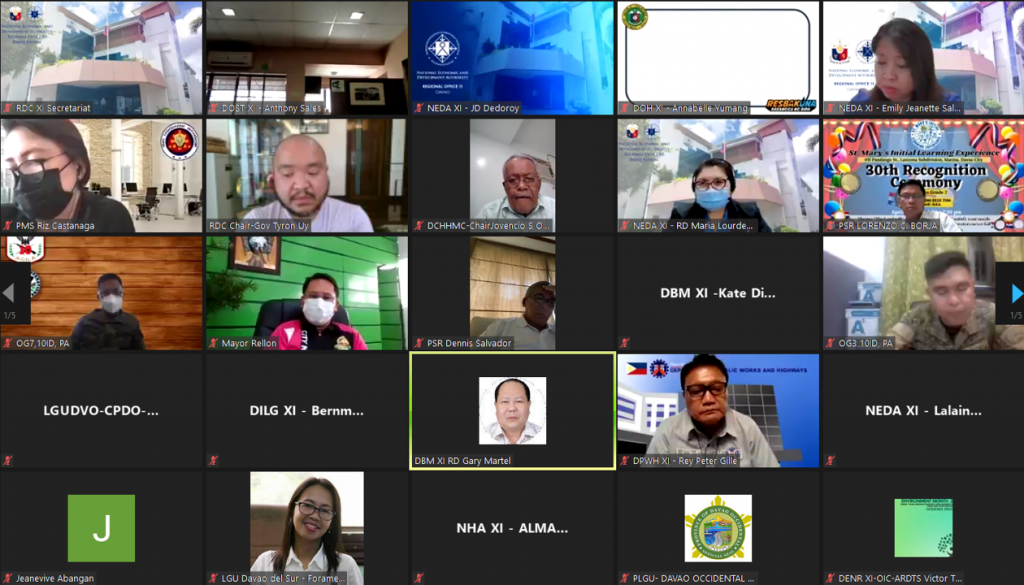
During the RDC XI Second Quarter Full Council Meeting on June 8, 2021, member-agencies and local government units in Davao Region were briefed on the salient features of Executive Order No. 138 entitled, “Full Devolution of Certain Functions of the Executive Branch to Local Governments, Creation of a Committee on Devolution, and for Other Purposes”, signed by President Rodrigo R. Duterte on June 1, 2021. The EO outlines the implementation of the Supreme Court Ruling on the Mandanas-Garcia Petitions, or the Mandanas Doctrine, beginning CY 2022.
Salient features of EO 138, series of 2021, include among others, the delineation of roles between the National Government and the Local Government Units (LGUs); the preparation of devolution transition plans (DTPs) by both the affected national government agencies (NGAs) and LGUs; creation of the Committee on Devolution, which shall oversee and monitor the implementation of administrative and fiscal decentralization goals of the EO as well as propose to Congress the amount constituting the Growth Equity Fund (GEF); capacity development for LGUs; the strengthening of planning, investment programming, and budget linkage and M&E systems across the bureaucracy; and, options for personnel of the affected NGAs. The EO stipulates that the National Government is fully committed to the policy of decentralization enshrined in the Philippine Constitution and relevant laws which are aimed at: i) developing capabilities of local governments to deliver basic social services and critical facilities to their constituents, increase productivity and employment, and promote local economic growth, and ii) ensuring accountability, competence, professionalism and transparency of local leaders through the development of institutional systems that uphold good governance and strengthen their capabilities for managing public resources. It covers all LGUs, departments, agencies and instrumentalities of the Executive Branch whose functions are in line with the devolved functions of the LGUs under Section 17 of Republic Act No. 7160, or the Local Government Code, and other pertinent laws.

In their DTPs, the NGAs shall identify and clarify the functions and services devolved to the LGUs, by level of LGU, and the strategy for and phasing of devolution to the LGUs in a span of three years and not going beyond FY 2024. The DTPs shall include the definition of standards for the delivery of devolved services, the strategy for the capacity development of LGUs, framework for LGU monitoring and performance assessment, and an organizational effectiveness proposal to strengthen the department/agency in assuming “steering functions” as part of the devolution efforts. The NGAs’ DTPs are due for submission to the DBM by their mother Departments within 120 days from the effectivity of EO 138, series of 2021.
The DBM, through its Regional Office in Davao, reported during the RDC XI Meeting that the Department of Tourism (DOT) has submitted the complete set of its DTP Annexes, while the Department of Health (DOH), Department of Social Welfare and Development (DSWD), and Department of Labor and Employment (DOLE) have submitted parts of their DTP Annexes. The Department of Trade and Industry (DTI) and Department of Public Works and Highways (DPWH), on the other hand, have conveyed their dissent to some of the programs, activities, and projects (PAPs) initially identified by DBM for discontinuance/reorientation under these Departments. The same are still currently being studied by DBM.

On the part of the LGUs, DILG XI informed that the DTPs required from all provincial, city, and municipal local governments shall serve as: i) the LGUs’ roadmaps to ensure systematic and coherent actions towards their full assumption of devolved functions and services, ii) reference of the LGU in carrying out its organizational strengthening efforts, and iii) leverage for support from NGAs and other stakeholders on the LGU’s capacity development needs, as well as, guide the design and implementation of NGA devolution transition activities. The LGUs’ DTPs shall include an inventory of existing services vis-à-vis the devolved functions, a proposal for organizational effectiveness in terms of structure/staffing pattern and capacity development agenda, and a strategy for compliance with service standards and the LGU’s contribution to strategic outcomes of the Philippine Development Plan.
Council members, especially the LGUs, look forward to receiving details on their National Revenue Allotments beginning FY 2022, including the Growth Equity Fund, in time for the preparation of their respective Annual Investment Plans for next year. The LGUs and affected NGAs likewise count on the support and guidance of DBM and DILG as they firm up and implement their DTPs.
-Faith L. Cabiles, NEDA XI
